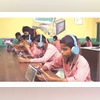A survey, conducted by the Life Skills Collaborative in partnership with Pratham Education Foundation and others, found that 80 per cent of rural youth were yet to pursue vocational or skill training, but an overwhelming 92 per cent of them used smartphones for various purposes, including education.
The top choice is computer courses among those who are undertaking some kind of vocational or skill training, revealed the survey conducted in rural India across 11 districts of Rajasthan, Uttar Pradesh, Maharashtra, Uttarakhand, Haryana, and Mizoram.
Almost 13 per cent of those surveyed are getting computer training, followed by stitching, which is being learnt by a bit over three per cent.
It should be noted that 12 per cent of those surveyed were not enrolled in any type of educational institutions -- school, college, vocational/skilling institution.
The Voices Survey 2023, which covered 32,028 respondents comprising 15,856 youth, 13,806 parents, and 2,366 school teachers during April and July 2023, revealed that there was a pronounced reliance on smartphones among rural youth.
As many as 92 per cent of those surveyed reported the use of smartphones, particularly for communication (92 per cent), entertainment (95 per cent), and education (88 per cent).
More From This Section
The survey, whose partners also included Breakthrough and Quest Alliance, found that rural youth, especially older males (19 to 22 years), leverage smartphones not just for entertainment but also for educational purposes, emphasizing the device's multifaceted role in their lives.
Besides the older group, the survey also covered the younger lot with 14 to 18 years of age.
The survey also showed that there is a marked rise in the category of “learning new things” among young women.
Nearly 67 per cent and 77 per cent of 14-18 and 19-22 age group female youth, respectively, reported using their phones to learn new things, as compared to 44 per cent and 51 per cent of male youth in the respective age groups.
The survey revealed that approximately four in 10 youth have heard of the term life skills or 21st-century skills. Life skills encompass a range of essential abilities that empower individuals to navigate the complexities of daily life. These skills extend beyond traditional academic knowledge, focusing on personal, social, and emotional competencies.
Teacher guidance (65 per cent) and school textbooks (36 per cent) emerged as the primary sources of life skills awareness among rural youth.
Rukmini Banerji, Chief Executive Officer of Pratham Education Foundation, said, "The findings underline the urgent need for initiatives that offer our young people opportunities to understand and acquire life skills."
The survey revealed that most youth who were familiar with life skills had heard about them from their teachers, illustrating the critical role of public education systems in integrating life skills education into the curriculum, she said.
Youth who owned a mobile phone were around twice as aware of the term ‘life skills’ as compared to those without access to a mobile. Similarly, youth who knew how to use a computer were around twice as much familiar with the term than those who didn’t, the survey showed.
)